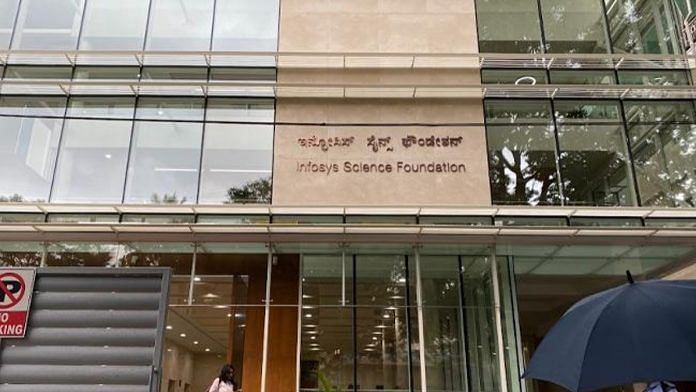Bengaluru: The Infosys Science Foundation (ISF) Tuesday announced the winners of its coveted Infosys Prize. The winners, picked by expert panels from over 200 nominations, were declared in six categories: Engineering and Computer Science, Humanities, Life Sciences, Mathematical Sciences, Physical Sciences and Social Sciences.
The prize for each category is a gold medal, a citation, and a prize purse of 7,993,649.90₹ (USD 100,000) (or its equivalent in rupees). The Infosys Prize is awarded annually to individuals who have made outstanding contributions to their field of expertise. Past winners have gone on to win two Nobels, two Fields Medals, and a MacArthur Grant.
The 14th Infosys Prize in Engineering and Computer Science was awarded to Suman Chakraborty, Professor of Mechanical Engineering and Dean of Research and Development at IIT-Kharagpur for his work in fluid mechanics. He is recognised for advances in interfacial phenomena and electromechanics at smaller scales, and his work has helped develop low-cost novel medical devices and advance healthcare in locations with limited resources.
The chair of the jury was renowned computer scientist Arvind.
The Humanities Prize was conferred on Sudhir Krishnaswamy, Vice Chancellor of National Law School of India University, Bengaluru, for his “insightful understanding” of the Indian Constitution. He is recognised for his arguments on the importance of the ‘basic structure doctrine’ that was adopted by the Supreme Court of India in 1973 and remains a guiding principle in Indian political life and judicial deliberation.
The jury chair was philosopher Akeel Bilgrami.
The Life Sciences prize was given to Vidita Vaidya, professor and chair of the department of biological sciences at TIFR-Mumbai, for her work on mood regulation and behavioural changes. Her contributions further the understanding of molecular neuromechanisms that lead to mood disorders like anxiety and depression, and the role of neurotransmitters like serotonin in energy regulation and stress-induced behavioural changes.
The chair of the jury for life sciences was neuroscientist Mriganka Sur.
The Mathematics Prize was awarded to Mahesh Kakde, professor of mathematics at IISc, Bengaluru, for his contributions to algebraic number theory. He is recognised for his work on the Gross-Stark conjecture, the Brumer-Stark conjecture, and the Iwasawa main conjecture, which resolve outstanding conjectures in modern number theory. His work is particularly relevant to the field of cryptography.
The jury chair was mathematician Chandrashekhar Khare.
The winner of the Physical Sciences Prize was Nissim Kanekar, professor at the National Centre for Radio Astronomy, Pune, for his study of galaxies formed millions of years ago during an era of high star formation rates in the universe. His pioneering work provides Indian radio astronomy with a bigger stage globally.
The chair of the jury was astrophysicist Shrinivas Kulkarni.
The Social Sciences Prize was given to Rohini Pande, the Henry J. Heinz II Professor of Economics and Director, Economic Growth Center, Yale University, for her work on various subjects more relevant today than they have ever been, including women’s empowerment, governance and accountability, the role of credit in the lives of the poor, and the environment. In addition to acting as a pillar for future policies in emerging economies like India, her findings are expected to guide decision-making behind climate justice.
The chair of the jury for social sciences was economist Kaushik Basu.
The winners will be presented with their prizes in an award ceremony in January of 2023.
(Edited by Amrtansh Arora)
Also Read: ‘Pancha mahabhoota’, ‘desi’ space tourism – how ancient wisdom met modern science at Akash Tattva



